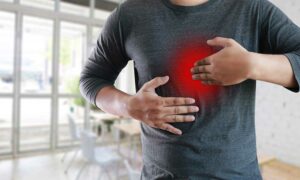Gastroesophageal reflux disease (GERD) is a common gastrointestinal disorder that affects millions of people worldwide. Characterized by chronic acid reflux, GERD can lead to a variety of uncomfortable symptoms, with heartburn being the most prevalent. However, an intriguing and lesser-known aspect of GERD is its potential to cause back pain. This article delves into the relationship between GERD and back pain, exploring the possible causes, symptoms, and management strategies.
Contents
Understanding GERD

To comprehend how GERD and back pain are connected, it’s essential to understand GERD itself. GERD arises when the lower esophageal sphincter (LES) weakens or relaxes inappropriately, allowing stomach acid to splash up into the esophagus. This acid reflux can lead to irritation and inflammation, resulting in the typical symptoms of GERD.
The hallmark symptoms of GERD include a burning sensation in the chest (heartburn) and regurgitation of sour-tasting acid into the mouth. However, GERD can also present with less common symptoms, and back pain is one of them. This atypical manifestation may be confusing for some individuals, leading them to seek relief for back pain without realizing its association with GERD.
The Connection between GERD and Back Pain
Back pain related to GERD is a less recognized symptom but can be a cause of significant discomfort for affected individuals. The exact mechanisms behind the connection between GERD and back pain are not yet fully understood, but several factors may contribute to this association:
- Nerve Irritation: The esophagus and certain back muscles share nerve pathways. Acid reflux and inflammation in the esophagus can potentially irritate these nerves, leading to referred pain in the back.
- Posture and Pressure: Chronic acid reflux may lead to frequent episodes of regurgitation, causing individuals to alter their posture to alleviate symptoms. Poor posture, especially when combined with increased pressure on the abdominal area, can lead to back pain over time.
- Hiatal Hernia: A hiatal hernia is a condition where a part of the stomach protrudes through the diaphragm into the chest cavity. This can cause both GERD and back pain, as the hernia may compress nerves in the area.
- Inflammation: Acid reflux can trigger inflammation in the esophagus and surrounding tissues. This inflammation may extend to the back, contributing to pain.
Symptoms of GERD-related Back Pain
The back pain associated with GERD may manifest in various forms, including:
- Dull, aching pain in the upper or middle back region.
- Radiating pain that moves from the upper abdomen to the back.
- Pain that worsens or eases with changes in body position.
- Pain that occurs shortly after meals or during episodes of acid reflux.
Diagnosing GERD and Back Pain
Diagnosing the relationship between GERD and back pain requires a thorough evaluation by a healthcare professional. Since back pain can have various causes, it is essential to determine if GERD is indeed contributing to or causing the discomfort. The diagnostic process typically involves the following steps:
- Medical History: The healthcare provider will start by taking a detailed medical history, including a discussion of your symptoms, their duration, and any factors that worsen or alleviate them. They may inquire about your diet, lifestyle, and any previous medical conditions.
- Physical Examination: A physical examination will be conducted to assess your overall health and check for any signs of GERD, such as heartburn, acid regurgitation, or chest pain. The physician may also assess your posture and palpate your back to identify any specific areas of tenderness.
- Symptom Evaluation: You will be asked to describe your back pain in detail, including its location, intensity, and any factors that trigger or relieve it. The timing of the pain concerning meals or acid reflux episodes will also be noted.
Treating GERD and Alleviating Back Pain

Treating GERD and alleviating back pain often involves a multi-faceted approach that addresses both conditions simultaneously. The primary goal is to manage acid reflux effectively while also providing relief from back pain. Here are some treatment strategies:
Lifestyle Modifications
- Diet: Avoid trigger foods that can exacerbate GERD symptoms, such as spicy, fatty, acidic, and fried foods. Opt for a well-balanced diet that includes fruits, vegetables, whole grains, and lean proteins.
- Portion Control: Eating smaller, more frequent meals can help prevent excessive pressure on the stomach and reduce the risk of acid reflux.
- Weight Management: Maintaining a healthy weight can alleviate pressure on the abdomen, reducing the likelihood of acid reflux and back pain.
- Posture: Practice good posture to minimize pressure on the abdomen and esophagus. Avoid lying down immediately after eating, and consider elevating the head of your bed by a few inches to prevent acid reflux during sleep.
- Smoking Cessation: If you smoke, quitting can help improve GERD symptoms and promote overall health.
Medications
- Antacids: Over-the-counter antacids can provide temporary relief by neutralizing stomach acid.
- H2 Blockers: Histamine H2-receptor antagonists like ranitidine or famotidine can reduce stomach acid production, providing more prolonged relief.
- Proton Pump Inhibitors (PPIs): PPIs like omeprazole or esomeprazole are powerful acid-suppressing medications that can help heal the esophagus and manage GERD symptoms.
- Prokinetics: These medications help improve esophageal motility and reduce the likelihood of acid reflux.
Managing GERD and Back Pain Together
Managing GERD and back pain together requires a comprehensive approach that addresses both conditions simultaneously. The aim is to alleviate GERD symptoms and back pain while minimizing their impact on daily life. Here are some strategies to manage GERD and back pain effectively:
Medical Supervision:
Consult a healthcare professional to accurately diagnose GERD and back pain, and to create a personalized treatment plan tailored to your specific needs.
Back Pain Management:
- Physical Therapy: Work with a physical therapist to strengthen back muscles, improve flexibility, and correct posture.
- Heat or Ice Therapy: Apply heat or ice to the affected area to alleviate back pain when needed.
- Corrective Exercises: Perform specific exercises that target back pain and improve core strength and flexibility.
Stress Reduction:
- Practice stress-reduction techniques such as meditation, deep breathing, yoga, or mindfulness to reduce stress, which can exacerbate GERD and back pain.
Elevate Head of Bed:
- Elevating the head of your bed by a few inches can help prevent acid reflux during sleep and potentially reduce nighttime GERD symptoms and back pain.
Regular Follow-up:
- Schedule regular follow-up appointments with your healthcare professional to monitor the effectiveness of the treatment plan and make any necessary adjustments.
Avoid Heavy Lifting and Strain:
- Minimize activities that may strain the back and exacerbate pain. If lifting heavy objects is necessary, use proper lifting techniques.
GERD, Back Pain, and Sleep

GERD, back pain, and sleep are interconnected, and managing these conditions effectively is essential for achieving restful and restorative sleep. Both GERD and back pain can disrupt sleep patterns and lead to a cycle of discomfort that affects overall well-being. Here’s how these conditions are related and some strategies to promote better sleep:
GERD and Sleep:
- Nighttime Symptoms: GERD symptoms often worsen when lying down, leading to heartburn, regurgitation, and throat discomfort. Acid reflux during sleep can interrupt sleep patterns and cause sleep disturbances.
- Sleep Disruption: Frequent awakenings due to GERD symptoms can prevent individuals from reaching deep sleep stages, leading to sleep deprivation and daytime fatigue.
- Sleep Position: The choice of sleep position can influence GERD symptoms. Sleeping on the back may worsen acid reflux, while sleeping on the left side can help alleviate symptoms.
- Trigger Foods: Consuming trigger foods close to bedtime can increase the likelihood of nighttime GERD symptoms.
Back Pain and Sleep:
- Sleep Disturbances: Back pain can make finding a comfortable sleep position challenging, leading to difficulty falling asleep or staying asleep.
- Sleep Posture: Poor sleep posture or an unsupportive mattress can exacerbate back pain during the night.
- Sleep Deprivation: Chronic back pain can lead to sleep disturbances, contributing to daytime fatigue and reduced quality of life.
Conclusion
Addressing GERD and back pain simultaneously is crucial for managing both conditions effectively. By seeking professional help, adopting lifestyle changes, and considering complementary treatments, individuals can find relief and enhance their overall well-being. Prioritizing a holistic approach to health will empower individuals to lead healthier, more comfortable lives.
If you’re experiencing Back pain, physical therapy for back pain at PhysioMantra can help: Book an online physical therapy session.



